For two decades, Jim Killen has served as the science fiction and fantasy book buyer for Barnes & Noble. Every month on Tor.com and the B&N Sci-Fi & Fantasy Blog, Jim shares his curated list of the month’s best science fiction & fantasy books.
Witchy Winter, by D.J. Butler
(April 3, Baen—Hardcover)
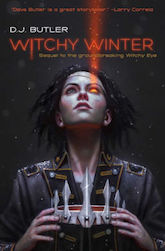 Butler’s followup to last year’s Witchy Eye brings us back to a raw, unsettled alt-America as teenager Sarah Calhoun arrives in Ohio to sit the Serpent Throne of Cahokia, hers by right of birth. Before she can claim the crown, she must deal with the regent and seven of her relatives, all of whom also claim rites of succession. Sarah’s lack of familiarity with the culture and traditions of her own people also proves to be a stumbling block. Elsewhere, more trouble brews: in New Orleans, a new priest rises to take up the mantle of dead Bishop Ukwu as the city is beset by opposing forces pursuing conflicting goals, and the Anishinaabe hunter Ma’iingan heads off on a quest to find a troubled but powerful healer named Nathaniel. It’s a worthy sequel that will draw in fans of the first novel, as Butler deepens an impressive fantasy world.
Butler’s followup to last year’s Witchy Eye brings us back to a raw, unsettled alt-America as teenager Sarah Calhoun arrives in Ohio to sit the Serpent Throne of Cahokia, hers by right of birth. Before she can claim the crown, she must deal with the regent and seven of her relatives, all of whom also claim rites of succession. Sarah’s lack of familiarity with the culture and traditions of her own people also proves to be a stumbling block. Elsewhere, more trouble brews: in New Orleans, a new priest rises to take up the mantle of dead Bishop Ukwu as the city is beset by opposing forces pursuing conflicting goals, and the Anishinaabe hunter Ma’iingan heads off on a quest to find a troubled but powerful healer named Nathaniel. It’s a worthy sequel that will draw in fans of the first novel, as Butler deepens an impressive fantasy world.
The Wolf, by Leo Carew
(April 3, Orbit—Paperback)
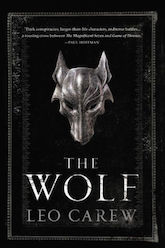 In a world inspired by Viking-era Europe, the Anakim, a race of giants living close to nature, haven’t been defeated in battle for centuries—until an upstart human Sutherner named Bellamus leads a successful attack against them, killing the Anakim leader and thus elevating his son Roper Kynortas to the throne. Grieving and unready for rule, Roper must not only deal with the surging Sutherners and their cunning leader, but also solidify his grip on power against threats both obvious and subtle, from the opposition of Uvoren, leader of the Sacred Guard and a hero of the Anakim; to the actions of hidden groups of women who operate under the radar in the otherwise male-dominated warrior culture. Roper is forced to seek any alliance he can in order to stave off the threat posed by Bellamus’ army—and one wrong move could topple him from his throne. Filled with action and bloody battles, Carew’s debut is an impressive start to the Under the Northern Sky series.
In a world inspired by Viking-era Europe, the Anakim, a race of giants living close to nature, haven’t been defeated in battle for centuries—until an upstart human Sutherner named Bellamus leads a successful attack against them, killing the Anakim leader and thus elevating his son Roper Kynortas to the throne. Grieving and unready for rule, Roper must not only deal with the surging Sutherners and their cunning leader, but also solidify his grip on power against threats both obvious and subtle, from the opposition of Uvoren, leader of the Sacred Guard and a hero of the Anakim; to the actions of hidden groups of women who operate under the radar in the otherwise male-dominated warrior culture. Roper is forced to seek any alliance he can in order to stave off the threat posed by Bellamus’ army—and one wrong move could topple him from his throne. Filled with action and bloody battles, Carew’s debut is an impressive start to the Under the Northern Sky series.
The Best Science Fiction of the Year: Volume Three, edited by Neil Clarke
(April 3, Night Shade Books—Paperback)
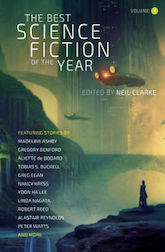 An immense number of SFF short stories are published each year, and if you are looking for someone to curate it for you, Neil Clarke is a wise choice—after all, as the founder of the lauded magazine Clarkesworld, he’s published many of the best of the best himself. For the third edition of his annual anthology series from Night Shade Books, he has once again assembled an impressive lineup of stories pulled across the genre publishing world. Among the more than 25 stories on offer are new classics by the likes of Alastair Reynolds, Nancy Kress, Greg Egan, Yoon Ha Lee, Peter Watts, Finbarr O’Reilly, and Tobias S. Buckell, pulled from places like Clarkesworld, Diabolical Plots, and Analog Science Fiction and Fact, among others, ranging from the famous to the more obscure. If you’re looking to discover new SFF authors, or simply seeking a sampler of the past year’s short fiction, this book is a good bet.
An immense number of SFF short stories are published each year, and if you are looking for someone to curate it for you, Neil Clarke is a wise choice—after all, as the founder of the lauded magazine Clarkesworld, he’s published many of the best of the best himself. For the third edition of his annual anthology series from Night Shade Books, he has once again assembled an impressive lineup of stories pulled across the genre publishing world. Among the more than 25 stories on offer are new classics by the likes of Alastair Reynolds, Nancy Kress, Greg Egan, Yoon Ha Lee, Peter Watts, Finbarr O’Reilly, and Tobias S. Buckell, pulled from places like Clarkesworld, Diabolical Plots, and Analog Science Fiction and Fact, among others, ranging from the famous to the more obscure. If you’re looking to discover new SFF authors, or simply seeking a sampler of the past year’s short fiction, this book is a good bet.
Though Hell Should Bar the Way, by David Drake
(April 3, Baen—Hardcover)
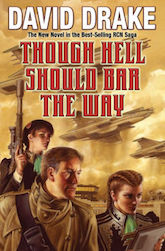 In Drake’s 12th book in the RCN series, Roy Olfetrie’s dreams of becoming an officer in the Republic of Cinnabar Navy are crushed when his father’s career ends in disgrace and a raft of criminal charges. Offered a chance to join a diplomatic mission to the planet Saguntum, Roy jumps on board—but upon arrival at the planet, he is pressed ganged into the crew of another ship, then taken prisoner by pirates, and finally, sold into slavery. Roy must figure out how to escape, rescue fellow slave Monica Smith from a harem maintained by the local admiral, and get back to Saguntum before it’s too late.
In Drake’s 12th book in the RCN series, Roy Olfetrie’s dreams of becoming an officer in the Republic of Cinnabar Navy are crushed when his father’s career ends in disgrace and a raft of criminal charges. Offered a chance to join a diplomatic mission to the planet Saguntum, Roy jumps on board—but upon arrival at the planet, he is pressed ganged into the crew of another ship, then taken prisoner by pirates, and finally, sold into slavery. Roy must figure out how to escape, rescue fellow slave Monica Smith from a harem maintained by the local admiral, and get back to Saguntum before it’s too late.
Scourged, by Kevin Hearne
(April 3, Del Rey—Hardcover)
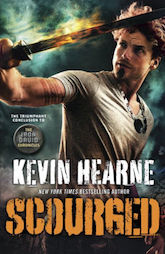 In the final book of Kevin Hearne’s bestselling Norse-inspired urban fantasy series, 2,000-year old druid Atticus O’Sullivan finds himself facing his greatest challenge ever when he squares off against Loki and Hel as the gods trying their best to set Ragnarok into motion. Worse, Loki and Hel have actually reached out to the other gods of mischief and darkness in other belief systems, forging alliances to increase their odds. Atticus does a fair bit of recruiting on his own, bringing together an Indian witch, a tyromancer, and even a god of his own to fight against those who wish to bring about the end of the world. Meanwhile, Granuaile MacTiernan and Archdruid Owen Kennedy have their own troubles to deal with—the former teaming up with immortals to fight the Yama Kings in Taiwan, the latter globetrotting in a frenzied effort to keep the world safe for druids everywhere. All of it twists together into a thrilling, satisfying final adventure for the Iron Druid, with stakes that couldn’t be higher.
In the final book of Kevin Hearne’s bestselling Norse-inspired urban fantasy series, 2,000-year old druid Atticus O’Sullivan finds himself facing his greatest challenge ever when he squares off against Loki and Hel as the gods trying their best to set Ragnarok into motion. Worse, Loki and Hel have actually reached out to the other gods of mischief and darkness in other belief systems, forging alliances to increase their odds. Atticus does a fair bit of recruiting on his own, bringing together an Indian witch, a tyromancer, and even a god of his own to fight against those who wish to bring about the end of the world. Meanwhile, Granuaile MacTiernan and Archdruid Owen Kennedy have their own troubles to deal with—the former teaming up with immortals to fight the Yama Kings in Taiwan, the latter globetrotting in a frenzied effort to keep the world safe for druids everywhere. All of it twists together into a thrilling, satisfying final adventure for the Iron Druid, with stakes that couldn’t be higher.
Grey Sister, by Mark Lawrence
(April 3, Ace—Hardcover)
 Lawrence returns with another novel in the world of last year’s Red Sister, one of our Best SFF of 2017 picks. As the novel opens, trained assassin Nona Grey has grown older but still day-to-day in extreme danger. The orphan girl turned lethal killer is nearing a decision point—she will soon have to choose her fate: become a Red Sister, fighting to protect herself and the order, or seek a life of service and study, delving into the mysteries of the universe. Her past crimes and immense power still make her a target, however, and she’s made enemies of several dangerous people: a failed assassin who burns to correct a mistake, a power-hungry woman leading the Inquisition, and a revenge-focused lord whose son Nona killed. This blood-spattered series features intriguing politics amid the scenes of sudden violence, and is populated by a host of fascinating, deadly women.
Lawrence returns with another novel in the world of last year’s Red Sister, one of our Best SFF of 2017 picks. As the novel opens, trained assassin Nona Grey has grown older but still day-to-day in extreme danger. The orphan girl turned lethal killer is nearing a decision point—she will soon have to choose her fate: become a Red Sister, fighting to protect herself and the order, or seek a life of service and study, delving into the mysteries of the universe. Her past crimes and immense power still make her a target, however, and she’s made enemies of several dangerous people: a failed assassin who burns to correct a mistake, a power-hungry woman leading the Inquisition, and a revenge-focused lord whose son Nona killed. This blood-spattered series features intriguing politics amid the scenes of sudden violence, and is populated by a host of fascinating, deadly women.
The Body Library, by Jeff Noon
(April 3, Angry Robot—Paperback)
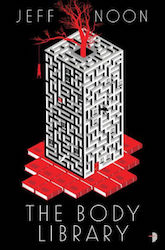 In the sequel to A Man of Shadows, private investigator John Nyquist escapes from a city split between perpetual day and perpetual night only to find himself in one where words are magic—and everyone is either a writer or a character in someone else’s writing. He wakes up in a room next to a corpse—but the corpse isn’t completely silent, and Nyquist is thrust into a mystery even as he struggles to literally write his own destiny in a place where ideas are chaotically shaping everything around him. Nyquist may be the only man capable of putting the city back into some sort of order, but he may have lost too much of himself already. This noir-tinged mystery might be even weirder than its predecessor, which is saying something.
In the sequel to A Man of Shadows, private investigator John Nyquist escapes from a city split between perpetual day and perpetual night only to find himself in one where words are magic—and everyone is either a writer or a character in someone else’s writing. He wakes up in a room next to a corpse—but the corpse isn’t completely silent, and Nyquist is thrust into a mystery even as he struggles to literally write his own destiny in a place where ideas are chaotically shaping everything around him. Nyquist may be the only man capable of putting the city back into some sort of order, but he may have lost too much of himself already. This noir-tinged mystery might be even weirder than its predecessor, which is saying something.
The Sisters Mederos, by Patrice Sarath
(April 3, Angry Robot—Paperback)
 Tesara and Yvienne Mederos are sisters whose merchant clan family was once the toast of high society in the city of Port Saint Frey, but has been ruined by a disaster at sea and the machinations of the corrupt Merchants Guild. Yet Tesara worries the reasons behind their downfall might not be that cut-and-dried—that her wild magic might have caused the storm that destroyed her family’s ships. While she guards that secret, the sisters return from their boarding school to Port Saint Frey and set about getting revenge against those who took advantage of that weakness. Yvienne uses the power of words to infiltrates a rich household, while Tesara begins gambling with the moneyed classes, looking for an opportunity. The sisters will have to learn how to lie, cheat, and steal if they’re going to restore their family’s fortunes.
Tesara and Yvienne Mederos are sisters whose merchant clan family was once the toast of high society in the city of Port Saint Frey, but has been ruined by a disaster at sea and the machinations of the corrupt Merchants Guild. Yet Tesara worries the reasons behind their downfall might not be that cut-and-dried—that her wild magic might have caused the storm that destroyed her family’s ships. While she guards that secret, the sisters return from their boarding school to Port Saint Frey and set about getting revenge against those who took advantage of that weakness. Yvienne uses the power of words to infiltrates a rich household, while Tesara begins gambling with the moneyed classes, looking for an opportunity. The sisters will have to learn how to lie, cheat, and steal if they’re going to restore their family’s fortunes.
Last Shot, by Daniel José Older
(April 8, Del Rey —Hardcover)
 Older tackles the shady backstory of two of the most interesting men in the Star Wars universe in this tie-in to May’s movie Solo: A Star Wars Story. Before the rise of A New Hope or an Empire’s Strike Back, Lando and Han try their hand at robbing a dangerous, brilliant inventor—Fyzen Gor—of a priceless transmitter. Years later, by now a hero of the resistance and raising a family with Princess Leia, Han is visited by Lando in the middle of the night. It seems his old friend is being hunted by assassins, and Gor’s thirst for vengeance is hot enough to threaten not just Lando, but all of Cloud City. Han and Lando must team up one more time in order to stop the inventor’s plans and make up for their past misdeeds—but they’ll need the help of group of fellow scoundrels and scum in order to have a fighting chance. We’re excited to see what a writer with Older’s chops and style will do with the toys offered up by the galaxy far, far away.
Older tackles the shady backstory of two of the most interesting men in the Star Wars universe in this tie-in to May’s movie Solo: A Star Wars Story. Before the rise of A New Hope or an Empire’s Strike Back, Lando and Han try their hand at robbing a dangerous, brilliant inventor—Fyzen Gor—of a priceless transmitter. Years later, by now a hero of the resistance and raising a family with Princess Leia, Han is visited by Lando in the middle of the night. It seems his old friend is being hunted by assassins, and Gor’s thirst for vengeance is hot enough to threaten not just Lando, but all of Cloud City. Han and Lando must team up one more time in order to stop the inventor’s plans and make up for their past misdeeds—but they’ll need the help of group of fellow scoundrels and scum in order to have a fighting chance. We’re excited to see what a writer with Older’s chops and style will do with the toys offered up by the galaxy far, far away.
Unbury Carol, by Josh Malerman
(April 10, Del Rey—Hardcover)
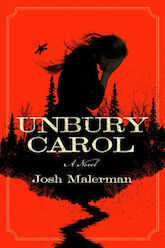 In this dark, weird western, a woman named Carol Evers suffers from a bizarre condition that periodically puts her into a temporary coma indistinguishable from death. For two to four days, she’s trapped in a strange consciousness or reality she calls Howltown, afflicted by a personification of rot that wants to claim her permanently. Only a few people know about her condition—her old lover James Moxie, who fled, unable to handle it; her current husband Dwight, greedy and growing tired of caring for her; and a household maid she confides in. When her next attack hits, Dwight determines to bury Carol before she awakens in order to claim her fortune—but Moxie gets word of his scheme and rides to save her, even as he is pursued by a ruthless inhuman killer. Meanwhile Carol faces her own demons in Howltown. Sleeping Beauty was never quite so strange, or so horrifying.
In this dark, weird western, a woman named Carol Evers suffers from a bizarre condition that periodically puts her into a temporary coma indistinguishable from death. For two to four days, she’s trapped in a strange consciousness or reality she calls Howltown, afflicted by a personification of rot that wants to claim her permanently. Only a few people know about her condition—her old lover James Moxie, who fled, unable to handle it; her current husband Dwight, greedy and growing tired of caring for her; and a household maid she confides in. When her next attack hits, Dwight determines to bury Carol before she awakens in order to claim her fortune—but Moxie gets word of his scheme and rides to save her, even as he is pursued by a ruthless inhuman killer. Meanwhile Carol faces her own demons in Howltown. Sleeping Beauty was never quite so strange, or so horrifying.
One Way, by Simon Morden
(April 10, Orbit—Paperback)
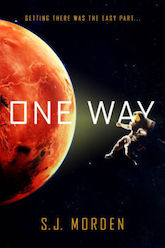 Frank Kittridge was once an architect skilled in the use of operating heavy machinery to construct buildings. Now, he’s a murderer serving a sentence that will see him dead in prison with no chance at parole. Until he gets an unexpected offer: serve out his sentence on Mars, helping to build a permanent base there. It’s a shot at something like freedom in a planet-sized prison (there’s no return trip in the cards) and a legacy he can be proud of. Meanwhile, the company gets free laborers that no one will weep over if something goes wrong. But once he’s landed on the Red Planet, things begin to go haywire for Frank in deadly ways—and Frank starts to think they’re not just accidents, plunging him into a fight for a life he’s just gotten back. It’s The Martian meets Escape from New York.
Frank Kittridge was once an architect skilled in the use of operating heavy machinery to construct buildings. Now, he’s a murderer serving a sentence that will see him dead in prison with no chance at parole. Until he gets an unexpected offer: serve out his sentence on Mars, helping to build a permanent base there. It’s a shot at something like freedom in a planet-sized prison (there’s no return trip in the cards) and a legacy he can be proud of. Meanwhile, the company gets free laborers that no one will weep over if something goes wrong. But once he’s landed on the Red Planet, things begin to go haywire for Frank in deadly ways—and Frank starts to think they’re not just accidents, plunging him into a fight for a life he’s just gotten back. It’s The Martian meets Escape from New York.
Not So Stories, edited by David Thomas Moore
(April 10, Abaddon—Paperback)
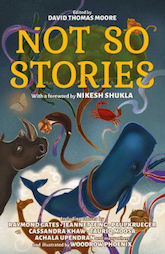 The Just So Stories of Rudyard Kipling are undeniable classics, a collection of children’s stories that offer children glimpses into an older world, more magical and mysterious than the one that’s made smaller by technology and the march of time. But those stories are also undeniably tough to swallow in 2018—Kipling was a product of his time, a man who saw the colonial empire he was a citizen of as a positive force in the world; his dismaying attitudes toward the native peoples of those conquered lands have aged his work poorly. Here, editor David Thomas Moore assembles a murderer’s row of today’s prominent and up-and-coming writers of color to reimagine these stories for the modern age. The results are funny, touching, and often profound. Contributors include Paul Krueger, Georgina Kamsika, Raymond Gates, and Cassandra Khaw, among many others.
The Just So Stories of Rudyard Kipling are undeniable classics, a collection of children’s stories that offer children glimpses into an older world, more magical and mysterious than the one that’s made smaller by technology and the march of time. But those stories are also undeniably tough to swallow in 2018—Kipling was a product of his time, a man who saw the colonial empire he was a citizen of as a positive force in the world; his dismaying attitudes toward the native peoples of those conquered lands have aged his work poorly. Here, editor David Thomas Moore assembles a murderer’s row of today’s prominent and up-and-coming writers of color to reimagine these stories for the modern age. The results are funny, touching, and often profound. Contributors include Paul Krueger, Georgina Kamsika, Raymond Gates, and Cassandra Khaw, among many others.
Fire Dance, by Ilana C. Myer
(April 10, Tor Books—Hardcover)
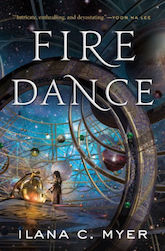 Myerreturns to the universe of her debut, Last Song Before Night, with a standalone adventure that treats the events of the earlier book as backstory, setting up a new tale of dangerous magic and political skulduggery. Lin Amaristoth has been freshly educated in magic, and as court poet of the Kingdom of Eivar, is sent to the kingdom’s ally Kahishi as part of an effort to help Kahishi with their struggle against the Fire Dancers, wielders of strange magic who are attacking border settlements. Lin finds herself adrift in an unfamiliar court where plots and treachery are commonplace, racing to discover the truth behind the attacks and discover the secrets of the Fire Dancers. Back home, Lin’s mentor Valanir Ocune struggles to oppose the new Archmaster of the Academy, Elissan Diar, who has established a secret cabal of “chosen” disciples to study dangerous and forbidden magics—but Ocune faces long odds, with few allies he can trust. Myer (who is also a contributor to this blog) builds fascinating worlds, but it is the people who populate them that truly make her novels sing.
Myerreturns to the universe of her debut, Last Song Before Night, with a standalone adventure that treats the events of the earlier book as backstory, setting up a new tale of dangerous magic and political skulduggery. Lin Amaristoth has been freshly educated in magic, and as court poet of the Kingdom of Eivar, is sent to the kingdom’s ally Kahishi as part of an effort to help Kahishi with their struggle against the Fire Dancers, wielders of strange magic who are attacking border settlements. Lin finds herself adrift in an unfamiliar court where plots and treachery are commonplace, racing to discover the truth behind the attacks and discover the secrets of the Fire Dancers. Back home, Lin’s mentor Valanir Ocune struggles to oppose the new Archmaster of the Academy, Elissan Diar, who has established a secret cabal of “chosen” disciples to study dangerous and forbidden magics—but Ocune faces long odds, with few allies he can trust. Myer (who is also a contributor to this blog) builds fascinating worlds, but it is the people who populate them that truly make her novels sing.
From Darkest Skies, by Sam Peters
(April 10, Gollancz—Paperback)
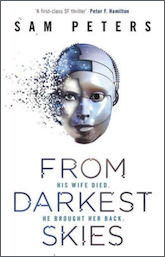 Detective tropes are given a techno-philosophical twist in this sci-fi mystery. Two hundred years in the future, an alien race known as the Masters have terraformed Earth and spread humanity into the universe, settling us on dozens of colony worlds. Keon Rause is a government agent returning to service on the planet Magenta after a five year leave of absence while he mourned his wife, a fellow agent killed in a terrorist explosion while investigating an unknown lead. Rause isn’t alone; he’s come back with an AI version of his wife, a digital reconstruction crafted from every trace of data she left behind—and crafted with the purpose of helping him figure out how and why she really died. Cashing in every favor he has left from his previous life, he finds himself following in her footsteps even as he struggles with his feelings for the simulacrum he’s created. It all leads to an impossible choice when he and his team stumble onto a disaster in the making: save the planet and lose his wife forever, or let something terrible happen and solve the mystery?
Detective tropes are given a techno-philosophical twist in this sci-fi mystery. Two hundred years in the future, an alien race known as the Masters have terraformed Earth and spread humanity into the universe, settling us on dozens of colony worlds. Keon Rause is a government agent returning to service on the planet Magenta after a five year leave of absence while he mourned his wife, a fellow agent killed in a terrorist explosion while investigating an unknown lead. Rause isn’t alone; he’s come back with an AI version of his wife, a digital reconstruction crafted from every trace of data she left behind—and crafted with the purpose of helping him figure out how and why she really died. Cashing in every favor he has left from his previous life, he finds himself following in her footsteps even as he struggles with his feelings for the simulacrum he’s created. It all leads to an impossible choice when he and his team stumble onto a disaster in the making: save the planet and lose his wife forever, or let something terrible happen and solve the mystery?
Taste of Wrath, by Matt Wallace
(April 10, Tor Books—Paperback)
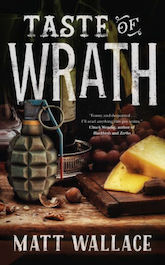 The seventh (and final) book in Wallace’s deadly sins-inspired Sin du Jour series finds the titular catering team facing a final choice: to stand together and resist, or to go quietly into that night. As the entity once known as Allensworth reveals its plans to take over the world—and the role Sin du Jour has unknowingly been playing in bringing them about—Bronko gathers the chefs and staff of caterers to the supernatural world and prepares them to go to war, calling in favors and using every dirty magical trick they’ve learned over the years to mount a resistance. Meat puppets, gnomes, demons—Allensworth throws everything at them, and not everyone is likely to walk away from this one—assuming anyone walks away at all.
The seventh (and final) book in Wallace’s deadly sins-inspired Sin du Jour series finds the titular catering team facing a final choice: to stand together and resist, or to go quietly into that night. As the entity once known as Allensworth reveals its plans to take over the world—and the role Sin du Jour has unknowingly been playing in bringing them about—Bronko gathers the chefs and staff of caterers to the supernatural world and prepares them to go to war, calling in favors and using every dirty magical trick they’ve learned over the years to mount a resistance. Meat puppets, gnomes, demons—Allensworth throws everything at them, and not everyone is likely to walk away from this one—assuming anyone walks away at all.
Space Opera, by Catherynne M. Valente
(April 10, Saga Press—Hardcover)
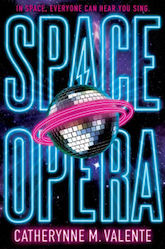 If you’ve been looking to get schwifty with a new space opera, look no further. Valente spins a truly nutty sci-fi story that begins with the Sentience Wars that nearly eradicated all intelligent life in the universe; when they ended, the scattered survivors regrouped and began a new tradition designed to avoid future apocalypses: the Metagalactic Grand Prix, a universe-wide competition of song and dance open only to recognized sentient species. When any new species emerges onto the universal stage to declare itself sentient—like, say, humanity—they must send contestants to the Metagalactic Grand Prix to prove their worth and quite literally sing for their lives (though alien singing doesn’t always sound like a Top 40 hit). Place anything but last and the upstart civilization is a part of the club. If they come in last…well, they’re quietly exterminated, in the name of preserving universal peace. (Tough choices, people…and not people.) When Earth is unexpectedly pulled into the next contest, the task of saving humanity falls to a has-been rock star named Decibel Jones, who must grapple with the demons of his past while venturing reluctantly onto the largest stage of all-time. It’s a a second chance to be a glitter-bombed rock star. or die trying—along with everyone else. Inspired by her dual love for Eurovision and Douglas Adams, this one is pure Catherynne Valente, from the first page to the last.
If you’ve been looking to get schwifty with a new space opera, look no further. Valente spins a truly nutty sci-fi story that begins with the Sentience Wars that nearly eradicated all intelligent life in the universe; when they ended, the scattered survivors regrouped and began a new tradition designed to avoid future apocalypses: the Metagalactic Grand Prix, a universe-wide competition of song and dance open only to recognized sentient species. When any new species emerges onto the universal stage to declare itself sentient—like, say, humanity—they must send contestants to the Metagalactic Grand Prix to prove their worth and quite literally sing for their lives (though alien singing doesn’t always sound like a Top 40 hit). Place anything but last and the upstart civilization is a part of the club. If they come in last…well, they’re quietly exterminated, in the name of preserving universal peace. (Tough choices, people…and not people.) When Earth is unexpectedly pulled into the next contest, the task of saving humanity falls to a has-been rock star named Decibel Jones, who must grapple with the demons of his past while venturing reluctantly onto the largest stage of all-time. It’s a a second chance to be a glitter-bombed rock star. or die trying—along with everyone else. Inspired by her dual love for Eurovision and Douglas Adams, this one is pure Catherynne Valente, from the first page to the last.
The Vestigial Heart, by Carme Torras
(April 13, MIT Press—Paperback)
 Celia is a sweet, emotionally rich 13-year -old when she is put into cryogenic sleep after being diagnosed with a incurable disease. When a cure is developed and she’s awoken, it’s far in the future, and the world has changed in disorienting ways—most notably, humanity has lost most of its emotions. Celia finds herself in a society in which emotional masseuses work to help people recover those lost feelings, where everyone is dependent on personal robots to get through their daily lives, and independent thought is deprecated in favor of search algorithms that make decisions for you. The relationship between our current technology and the future evolution of the human heart is just one challenge facing young Celia as she makes her way alone into a brave new world.
Celia is a sweet, emotionally rich 13-year -old when she is put into cryogenic sleep after being diagnosed with a incurable disease. When a cure is developed and she’s awoken, it’s far in the future, and the world has changed in disorienting ways—most notably, humanity has lost most of its emotions. Celia finds herself in a society in which emotional masseuses work to help people recover those lost feelings, where everyone is dependent on personal robots to get through their daily lives, and independent thought is deprecated in favor of search algorithms that make decisions for you. The relationship between our current technology and the future evolution of the human heart is just one challenge facing young Celia as she makes her way alone into a brave new world.
The City of Lost Fortunes, by Bryan Camp
(April 17, John Joseph Adams—Hardcover)
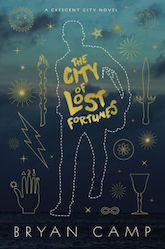 In Camp’s debut, New Orleans is a city filled with magic, gods, and demi-gods—like Jude Dubuisson. Once a street musician who used his magic to locate missing people and possessions, Jude was broken by Hurricane Katrina and the endless loss it bred into the firmament of the city. Retreating into a hermit’s life, he’s cut himself off from the world. But when the God of Fortune is killed, Jude is pulled back into the mix in a big way. With steep odds against finding a happy ending for himself, he decides to save what he can in the city he loves, and for the people who live there. Camp’s style and storytelling have been compared to jazz, with particular praise heaped upon the transformation of post-Katrina New Orleans into an even more otherworldly place.
In Camp’s debut, New Orleans is a city filled with magic, gods, and demi-gods—like Jude Dubuisson. Once a street musician who used his magic to locate missing people and possessions, Jude was broken by Hurricane Katrina and the endless loss it bred into the firmament of the city. Retreating into a hermit’s life, he’s cut himself off from the world. But when the God of Fortune is killed, Jude is pulled back into the mix in a big way. With steep odds against finding a happy ending for himself, he decides to save what he can in the city he loves, and for the people who live there. Camp’s style and storytelling have been compared to jazz, with particular praise heaped upon the transformation of post-Katrina New Orleans into an even more otherworldly place.
The Long Sunset, by Jack McDevitt
(April 17, Saga Press—Hardcover)
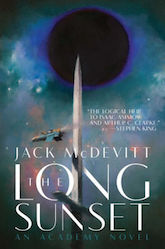 The eighth book in the Academy Series offers an ideal on-boarding point for new readers. Interstellar pilot Priscilla “Hutch” Hutchins is tapped to lead an urgent World Space Authority mission in response to a 7,000-year old alien transmission composed of video of a beautiful waterfall accompanied by music. WSA consultant Derek Blanchard is racing against the clock as a xenophobic government plans to pass legislation making space exploration illegal. When Hutch and the team make first contact, it goes unexpectedly—but optimistically so, in juxtaposition to the news headlines screaming from Earth of celebrity gossip, mass shootings, and dubious scientific breakthroughs that prove that in this future, human nature hasn’t advanced as much as our technology.
The eighth book in the Academy Series offers an ideal on-boarding point for new readers. Interstellar pilot Priscilla “Hutch” Hutchins is tapped to lead an urgent World Space Authority mission in response to a 7,000-year old alien transmission composed of video of a beautiful waterfall accompanied by music. WSA consultant Derek Blanchard is racing against the clock as a xenophobic government plans to pass legislation making space exploration illegal. When Hutch and the team make first contact, it goes unexpectedly—but optimistically so, in juxtaposition to the news headlines screaming from Earth of celebrity gossip, mass shootings, and dubious scientific breakthroughs that prove that in this future, human nature hasn’t advanced as much as our technology.
Blackfish City, by Sam J. Miller
(April 17, Ecco—Hardcover)
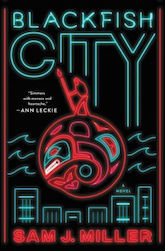 Set in the floating city of Qaanaaq, built in the arctic circle in the wake of the terrible climate wars that saw ground-level cities burned and razed, Miller’s adult debut (his lightly fantastical YA The Art of Starving was one of the most acclaimed books of last year) is an intricate jewel box of ideas. The floating city is a marvel of engineering, but is starting to show the strain: poverty is rising, and crime and unrest along with it. A new disease known as the Breaks—which throws the infected into the midst of other people’s memories—is sweeping the population. When a woman arrives in Blackfish City riding on an Orca and accompanied by a polar bear, she’s an instant celebrity, dubbed the Orcamancer. She takes advantage of her fame to draw together the citizens Qaanaaq and set in motion acts of resistance and rebellion that will have incredible impact, leading four people them in particular to see through the corruption, lies, and marvels of the city to the shocking truths beneath. This is the kind of swirling, original sci-fi we live for.
Set in the floating city of Qaanaaq, built in the arctic circle in the wake of the terrible climate wars that saw ground-level cities burned and razed, Miller’s adult debut (his lightly fantastical YA The Art of Starving was one of the most acclaimed books of last year) is an intricate jewel box of ideas. The floating city is a marvel of engineering, but is starting to show the strain: poverty is rising, and crime and unrest along with it. A new disease known as the Breaks—which throws the infected into the midst of other people’s memories—is sweeping the population. When a woman arrives in Blackfish City riding on an Orca and accompanied by a polar bear, she’s an instant celebrity, dubbed the Orcamancer. She takes advantage of her fame to draw together the citizens Qaanaaq and set in motion acts of resistance and rebellion that will have incredible impact, leading four people them in particular to see through the corruption, lies, and marvels of the city to the shocking truths beneath. This is the kind of swirling, original sci-fi we live for.
From Unseen Fire, by Cass Morris
(April 17, DAW—Hardcover)
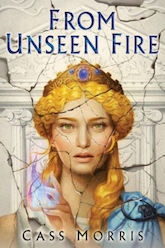 In an alternate Rome, the dictator Ocella is assassinated, and forces political, military, and magical instantly begin maneuvering to fill the power vacuum that’s left. Latona of the Vitelliae, a skilled mage of spirit and fire, can finally use her powers in public now that the dictator who hated her family is dead—but she is unsure and afraid. Her sisters vie for influence in their own way, while Senator Sempronius—breaking sacred law that forbids mages from serving in the Senate—finds himself dealing with rival factions that seek to unmask him even as he struggles to plan the city’s defense from potential rebels invading from the north. When Latona and Sempronius are pulled together by the whirring gears of power, they find they form a potent team, and together, they just might shape the fate of an empire. Morris’ ambitious debut is rich in detail and intricate in its plotting.
In an alternate Rome, the dictator Ocella is assassinated, and forces political, military, and magical instantly begin maneuvering to fill the power vacuum that’s left. Latona of the Vitelliae, a skilled mage of spirit and fire, can finally use her powers in public now that the dictator who hated her family is dead—but she is unsure and afraid. Her sisters vie for influence in their own way, while Senator Sempronius—breaking sacred law that forbids mages from serving in the Senate—finds himself dealing with rival factions that seek to unmask him even as he struggles to plan the city’s defense from potential rebels invading from the north. When Latona and Sempronius are pulled together by the whirring gears of power, they find they form a potent team, and together, they just might shape the fate of an empire. Morris’ ambitious debut is rich in detail and intricate in its plotting.
Before Mars, by Emma Newman
(April 17, Ace—Paperback)
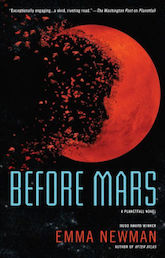 Newman returns a third time to her Planetfall universe with this creepy, moving psychological sci-fi mystery. Celebrated artist Anna Kubrin is struggling with postpartum depression after the birth of her child, so an offer from a billionaire to spend some time on Mars as its resident geologist and artist seems like the perfect escape. When she arrives on the Red Planet months later, she’s shocked to discover a painting clearly created by her—and the work seems to be warning her not to trust the colony’s resident psychiatrist. Other details don’t add up, and Anna begins to wonder if she’s enmeshed in some sort of huge conspiracy—or if she’s losing her mind. Isolated and far, far away from those she can trust, Anna sees only one way out, and that’s to delve deeper into the mystery. Newman is a fine fantasist, but her science fiction has proven to be truly otherworldly; this one is again likely to stand alongside the year’s best books.
Newman returns a third time to her Planetfall universe with this creepy, moving psychological sci-fi mystery. Celebrated artist Anna Kubrin is struggling with postpartum depression after the birth of her child, so an offer from a billionaire to spend some time on Mars as its resident geologist and artist seems like the perfect escape. When she arrives on the Red Planet months later, she’s shocked to discover a painting clearly created by her—and the work seems to be warning her not to trust the colony’s resident psychiatrist. Other details don’t add up, and Anna begins to wonder if she’s enmeshed in some sort of huge conspiracy—or if she’s losing her mind. Isolated and far, far away from those she can trust, Anna sees only one way out, and that’s to delve deeper into the mystery. Newman is a fine fantasist, but her science fiction has proven to be truly otherworldly; this one is again likely to stand alongside the year’s best books.
The Real-Town Murders, by Adam Roberts
(April 17, Gollancz—Hardcover)
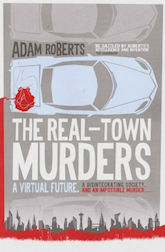 In a near-future England, Alma is one of the few people not permanently plugged into The Shine, the ultra-addictive and immersive successor to the internet that’s so compelling, the world is slowly breaking down due to lack of human interest in maintaining it. Making her life even harder, Alma’s lover is sick and requires a specific treatment every four hours without fail—and Alma’s the only one who can administer it. When she’s called to an automated factory in her role as private investigator, she’s handed an impossible crime: a dead body in the trunk of a newly-built car in the middle of a factory of robots. As she digs into the mystery, she finds herself neck-deep in a political coup—and has to start making moves fast in order to get home in time to keep her partner alive. Adam Roberts rarely disappoints, and never writes the same book twice; this one, released in the U.K. last year, is a keeper.
In a near-future England, Alma is one of the few people not permanently plugged into The Shine, the ultra-addictive and immersive successor to the internet that’s so compelling, the world is slowly breaking down due to lack of human interest in maintaining it. Making her life even harder, Alma’s lover is sick and requires a specific treatment every four hours without fail—and Alma’s the only one who can administer it. When she’s called to an automated factory in her role as private investigator, she’s handed an impossible crime: a dead body in the trunk of a newly-built car in the middle of a factory of robots. As she digs into the mystery, she finds herself neck-deep in a political coup—and has to start making moves fast in order to get home in time to keep her partner alive. Adam Roberts rarely disappoints, and never writes the same book twice; this one, released in the U.K. last year, is a keeper.
Season of Storms, by by Andrzej Sapkowski
(April 17, Orbit—Hardcover)
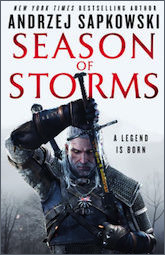 After a prolonged absence from long-form fiction, Geralt of Rivia, a.k.a. The Witcher, returns in a tale set before the events of the short story “The Witcher.” Geralt gains even more renown as a monster hunter when he kills an idr, using people as bait—but failing to protect them all in the process. With his reputation at an all-time high, he raises his fees, but finds himself accused of stealing from the crown and thrown into jail. When he finally secures his release, he learns that his steel and silver swords—the tools of a Witcher—have been stolen, and he sets off on a quest to retrieve them. This, of course, proves more difficult than it should be—and now that he’s without his weapons, his enemies are gathering like storm clouds on the horizon.
After a prolonged absence from long-form fiction, Geralt of Rivia, a.k.a. The Witcher, returns in a tale set before the events of the short story “The Witcher.” Geralt gains even more renown as a monster hunter when he kills an idr, using people as bait—but failing to protect them all in the process. With his reputation at an all-time high, he raises his fees, but finds himself accused of stealing from the crown and thrown into jail. When he finally secures his release, he learns that his steel and silver swords—the tools of a Witcher—have been stolen, and he sets off on a quest to retrieve them. This, of course, proves more difficult than it should be—and now that he’s without his weapons, his enemies are gathering like storm clouds on the horizon.
The Best Science Fiction & Fantasy of the Year: Volume 12, edited by Jonathan Strahan
(April 17, Solaris—Paperback)
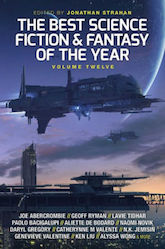 The month’s other essential look back at the year that was. Edited by World Fantasy Award winner Jonathan Strahan, this huge collection sports some of the sharpest short form writing in the genre from the past year. Standout stories include “Don’t Press Charges and I Won’t Sue” by Charlie Jane Anders, “The Moon is Not a Battlefield” by Indrapramit Das, “The Lamentation of their Women” by Kai Ashante Wilson, and “The Secret Life of Bots” by Suzanne Palmer. Though make no mistake, these are all standouts, really; Strahan has selected well, and every single one is worth reading, either because you already love the writer, or because you’re about to discover a new favorite.
The month’s other essential look back at the year that was. Edited by World Fantasy Award winner Jonathan Strahan, this huge collection sports some of the sharpest short form writing in the genre from the past year. Standout stories include “Don’t Press Charges and I Won’t Sue” by Charlie Jane Anders, “The Moon is Not a Battlefield” by Indrapramit Das, “The Lamentation of their Women” by Kai Ashante Wilson, and “The Secret Life of Bots” by Suzanne Palmer. Though make no mistake, these are all standouts, really; Strahan has selected well, and every single one is worth reading, either because you already love the writer, or because you’re about to discover a new favorite.
The Defiant Heir, by Melissa Caruso
(April 24, Orbit—Paperback)
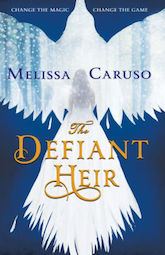 Caruso’s second in the Swords and Fire Series (after The Tethered Mage) opens with the threat of war smothering the Venice-like Raverra. The Witch Lords of Vaskandar are preparing to invade, but first they must observe ancient law and call a gathering of the 17 lords to vote. Lady Amalia Cornaro sees Raverra’s only slim hope in this delay—and she and her tethered mage, Zaira, head into enemy territory to do whatever they must to ensure that the conclave of lords turns away from invasion—disobeying orders from Raverra’s ruling council and putting their lives in danger in a desperate bid to save the empire.
Caruso’s second in the Swords and Fire Series (after The Tethered Mage) opens with the threat of war smothering the Venice-like Raverra. The Witch Lords of Vaskandar are preparing to invade, but first they must observe ancient law and call a gathering of the 17 lords to vote. Lady Amalia Cornaro sees Raverra’s only slim hope in this delay—and she and her tethered mage, Zaira, head into enemy territory to do whatever they must to ensure that the conclave of lords turns away from invasion—disobeying orders from Raverra’s ruling council and putting their lives in danger in a desperate bid to save the empire.
Time Was, by Ian McDonald
(April 24, Tor Books—Paperback)
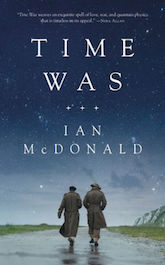 During World War II, Tom and Ben meet amid the Blitz while working on a project to render British targets invisible to German instruments. Teamed in close quarters, they find themselves falling in love during a period in history when such relationships are dangerous. Then something goes wrong with the project, and Ben and Tom disappear. No bodies are ever found, and the pair are presumed dead. Solving the mystery of what happened to them will fall into the hands of a grizzled old collector of those rare objects, physical books, in a time a few decades hence; tracing odd clues left in handmade copies of a particular poetry book, the booksellers begins to discover the secrets of a romance unbound by time. This slender novella is a chance of pace from an an author known for his densely plotted future fables (River of Gods), but it loses none of its emotional power for a lack of additional pages.
During World War II, Tom and Ben meet amid the Blitz while working on a project to render British targets invisible to German instruments. Teamed in close quarters, they find themselves falling in love during a period in history when such relationships are dangerous. Then something goes wrong with the project, and Ben and Tom disappear. No bodies are ever found, and the pair are presumed dead. Solving the mystery of what happened to them will fall into the hands of a grizzled old collector of those rare objects, physical books, in a time a few decades hence; tracing odd clues left in handmade copies of a particular poetry book, the booksellers begins to discover the secrets of a romance unbound by time. This slender novella is a chance of pace from an an author known for his densely plotted future fables (River of Gods), but it loses none of its emotional power for a lack of additional pages.
This post was published simultaneously on the B&N Sci-Fi and Fantasy Blog.










